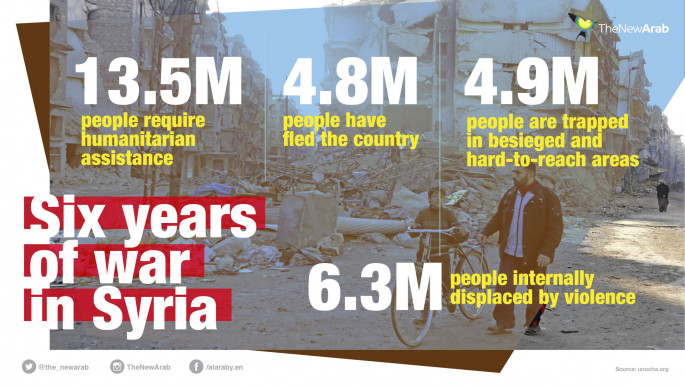Hundreds of doctors 'tortured and executed' by Syrian regime
Routine attacks on hospitals coupled with a system of torture and executions has made Syria one of the most dangerous locations in the world to work as a health worker.
Since September 2016 alone, at least 32 have been killed, bringing "the total number of health workers killed in acts of war crimes over the six years of the conflict to 814," a new study, published in The Lancet, has found.
This "weaponisation" of healthcare has caused drastic and horrific consequences for the civilians who live under this constant warfare.
In East Aleppo, fighting prevented an anti-measles campaign by Medecins Sans Frontieres (MSF) in October during an outbreak - causing the unnecessary deaths of hundreds of young children.
Pregnant women across the country have also resorted to undertaking labour at home in unsafe and unsterile conditions - placing themselves and their unborn children in danger.
 |
101 health workers were tortured to death and 61 were executed, mainly by regime forces. |  |
For those civilians that did receive medical attention, death by infection was also rife due to a lack of antibiotics, A report from the healthcare NGO, Physicians for Human Rights, found evidence that thousands of civilians were dying of infection, as security forces were not allowing medical supplies through checkpoints.
International NGOs have called on Damascus to ensure that healthcare and humanitarian aid is made more accessible to civilians.
"All parties to the conflict, neighbouring countries and international actors must allow access for humanitarian aid and not use it as a political tool," said Pablo Marco, MSF Middle East operations manager.
 |
|
| [Click to expand] |
The report's statistics tell a harrowing story of life in Syria, where 101 health workers were tortured to death and 61 were executed, mainly by regime forces.
The bombing of hospitals and clinics was the largest cause of deaths, the report found - accounting for 426 deaths, over 55 percent of the total.
An estimated 15,000 doctors - approximately half the population that existed before the war - have fled the war-torn country, leaving hundreds of thousands of civilians without healthcare.
Experts from universities in Beirut, Britain and the United States, as well as the Syrian American Medical Society (SAMS) and Multi-Aid Programs, compiled the data to form one of the "strongest independent analysis of the Syrian health worker crisis published so far".
 |
The bombing of hospitals and clinics was the largest cause of deaths, the report found - accounting for 426 deaths, over 55 percent of the total. |  |
A 2016 report by MSF, a healthcare NGO, found that 81 medical facilities were damaged or destroyed in Azaz and Aleppo districts in 2016 alone. This followed 94 attacks on facilities in 2015, killing 81 healthcare staff.
The most recent report from the United Nation's Human Rights Council found that both sides of the conflict had perpetrated war crimes and that the regime-backed forces had purposefully targeted civilian areas.
"Between July and December 2016, Syrian and Russian forces carried out daily airstrikes, claiming hundreds of lives and reducing hospitals, schools and markets to rubble," the report reads.
"Fearing bombardments, civilians avoided hospitals, including pregnant women, who increasingly gave birth at home without medical assistance or opted for caesareans to avoid hours in labour in hospital."
Wednesday marks the sixth anniversary since the Syrian conflict began.
 |
Fearing bombardments, civilians avoided hospitals, including pregnant women, who increasingly gave birth at home without medical assistance or opted for caesareans to avoid hours in labour in hospital |  |
The Baath regime, in power since 1963 and led by President Bashar al-Assad, responded to peaceful protests by civilians demanding democratic reforms during the Arab Spring with military force.
According to independent monitors, hundreds of thousands of civilians have been killed in the war, mostly by the regime and its powerful allies, and millions have been displaced both inside and outside of Syria.
The brutal tactics pursued mainly by the regime, which have included the use of chemical weapons, sieges, mass executions and torture against civilians have led to war crimes investigations.
This brutal repression culminated in a military surge in late September 2015, when Russia joined Syrian government forces to help retake rebel-controlled areas.
"2016 marked the worst year of the conflict to date in terms of attacks on medical facilities," the study said.



